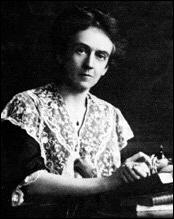Related Research Articles

The Gospel of James is a second-century infancy gospel telling of the miraculous conception of the Virgin Mary, her upbringing and marriage to Joseph, the journey of the couple to Bethlehem, the birth of Jesus, and events immediately following. It is the earliest surviving assertion of the perpetual virginity of Mary, meaning her virginity not just prior to the birth of Jesus, but during and afterwards, and despite being condemned by Pope Innocent I in 405 and rejected by the Gelasian Decree around 500, became a widely influential source for Mariology.
Greek literature dates back from the ancient Greek literature, beginning in 800 BC, to the modern Greek literature of today.

Edith Hamilton was an American educator and internationally known author who was one of the most renowned classicists of her era in the United States. A graduate of Bryn Mawr College, she also studied in Germany at the University of Leipzig and the University of Munich. Hamilton began her career as an educator and head of the Bryn Mawr School, a private college preparatory school for girls in Baltimore, Maryland; however, Hamilton is best known for her essays and best-selling books on ancient Greek and Roman civilizations.

Helen King is a British classical scholar and advocate for the medical humanities. She is Professor Emerita of Classical Studies at the Open University. She was previously Professor of the History of Classical Medicine and Head of the Department of Classics at the University of Reading.

Jane Dammen McAuliffe is an American educator, scholar of Islam and the inaugural director of national and international outreach at the Library of Congress.
Edith Hall, is a British scholar of classics, specialising in ancient Greek literature and cultural history, and professor in the Department of Classics and Ancient History at Durham University. She is a Fellow of the British Academy. From 2006 until 2011 she held a Chair at Royal Holloway, University of London, where she founded and directed the Centre for the Reception of Greece and Rome until November 2011. She resigned over a dispute regarding funding for classics after leading a public campaign, which was successful, to prevent cuts to or the closure of the Royal Holloway Classics department. Until 2022, she was a professor at the Department of Classics at King's College London. She also co-founded and is Consultant Director of the Archive of Performances of Greek and Roman Drama at Oxford University, Chair of the Gilbert Murray Trust, and Judge on the Stephen Spender Prize for poetry translation. Her prizewinning doctoral thesis was awarded at Oxford. In 2012 she was awarded a Humboldt Research Prize to study ancient Greek theatre in the Black Sea, and in 2014 she was elected to the Academy of Europe. She lives in Cambridgeshire.
De recta in Deum fide, also known as the Dialogue of Adamantius, is an anonymous Christian dialogue in Greek from the late 3rd or early 4th century. It was probably written in Asia Minor or Syria. It is a defence of Christian orthodoxy against the heresies of Marcionism and Gnosticism.

Mara bar Serapion, or "Mara son of Serapion", was a Syriac Stoic philosopher in the Roman province of Syria. He is only known from a letter he wrote in Syriac to his son, who was named Serapion, which refers to the execution of "the wise king of the Jews" and may be an early non-Christian reference to Jesus of Nazareth.

Meredith J. C. Warren is a Senior Lecturer in Biblical and Religious Studies at the University of Sheffield. She is known for her views on the New Testament and early Judaism as well as for her media appearances for such outlets as The Washington Post, and BBC radio. She is a Metis citizen of the Manitoba Metis Federation.

Kate Cooper is a Professor of History and former head of the History Department at Royal Holloway, University of London, a role to which she was appointed in September 2017 and she stood down in 2019. She was previously Professor of Ancient History and Head of the Department of Classics and Ancient History at the University of Manchester, where she taught from 1995.
Tessa Rajak is a British historian and Emeritus Professor of Ancient history at the University of Reading. She is also a Senior Associate of the Oxford Centre for Hebrew and Jewish Studies and Fellow of Somerville College, Oxford. Her research focuses primarily on Judaism in the Hellenistic and Roman periods, and she is an expert on the writings of Josephus.
Gretchen Reydams-Schils is Professor in the Program of Liberal Studies at the University of Notre Dame, and holds concurrent appointments in Classics, Philosophy, and Theology. She is a specialist in Plato and the traditions of Platonism and Stoicism.

Ellen Muehlberger is an American scholar of Christianity and late antiquity, Professor of History and Middle East Studies at the University of Michigan-Ann Arbor with appointments in Classical Studies and the Frankel Center for Judaic Studies.

Ilaria L. E. Ramelli is an Italian-born historian, academic author, and university professor who specializes in ancient, late antique, and early mediaeval philosophy and theology.
Rhiannon Ash is a British classical scholar specialising in Latin literature and Tacitus. She is professor of Roman Historiography in the Faculty of Classics, University of Oxford, and a Fellow of Merton College, Oxford. She was formerly a lecturer at the Department of Greek and Latin at University College, London.

Helen V. Lovatt is Professor of Classics at the University of Nottingham. She is known in particular for her work on Latin epic literature especially from the Flavian period.

Zahra Newby is Professor of Classics and Ancient History at the University of Warwick. She is known in particular for her work on Greek mythology in Roman art and the visual culture of Greek festivals in the Roman east. Newby is currently the Head of the Classics and Ancient History Department at the University of Warwick.

Judith Sheila McKenzie was an Australian archaeologist whose work primarily focused on the architecture of the ancient Middle East. At the time of her death, McKenzie was Associate Professor of Late Antique Egypt and the Holy Land at the University of Oxford and Director of the Manar al-Athar project, an open-access image archive of the Middle East. McKenzie was known in particular for her work on the architecture of Petra and Alexandria, having published lengthy monographs on each.
Nanno (Ourania) Marinatos is Professor Emerita of Classics and Ancient Mediterranean Studies at the University of Illinois Chicago, whose research focuses on the Minoan civilisation, especially Minoan religion.
Seneca the Younger's Letter 47 of his Epistulae Morales ad Lucilium, sometimes known as On Master and Slave or On Slavery, is an essayistic look at dehumanization in the context of slavery in ancient Rome. It was a criticism of aspects of Roman slavery, without outright opposition to it, and had a favorable later reception by Enlightenment philosophers and subsequently the 19th century abolitionist movement. Conversely, the text has also been seen as a proslavery apologia, as well as in the light of the Stoic philosophical idea that "all men are slaves".
References
- ↑ "Judith Perkins, Ph.D." University of Saint Joseph. Retrieved 20 March 2021.
- 1 2 3 4 5 The narrative self in early Christianity : essays in honor of Judith Perkins. Judith Perkins, Janet E. Spittler. Atlanta. 2019. ISBN 978-1-62837-251-9. OCLC 1102325424.
{{cite book}}: CS1 maint: location missing publisher (link) CS1 maint: others (link) - ↑ Perkins, Judith (1972). Valerius Flaccius; Synonyms and style, by Judith Bailey Perkins (Thesis). Toronto. OCLC 224093256.
- ↑ "The narrative self in early Christianity: essays in honor of Judith Perkins – Bryn Mawr Classical Review". Bryn Mawr Classical Review. Retrieved 2021-03-13.
- ↑ "Society of Biblical Literature". secure.aidcvt.com. Retrieved 2021-03-13.